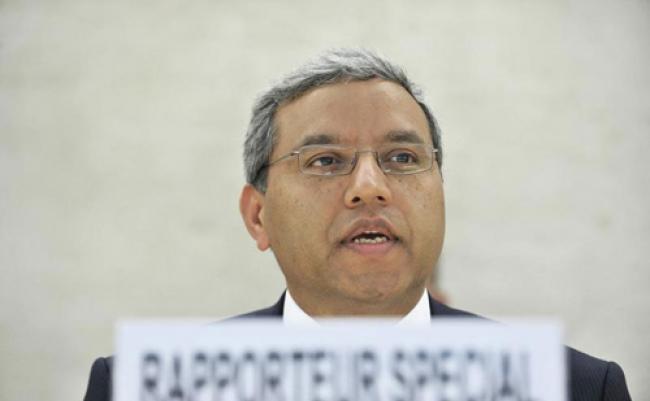26 Jun 2014, 04:30 pm Print

Surya P. Subedi commended the Government’s response to a recent sudden and massive return of Cambodian migrant workers from Thailand and called on the Thai authorities to investigate the reported deaths of others as well as to ascertain the reasons behind the sudden return of such large numbers of Cambodians.
“I remain convinced that there is reason for optimism for the long-term development of the nation,” Mr. Subedi said. “I welcome the release, even though on suspended prison sentence, of the 25 arrested and detained in relation to events in November 2013 and January 2014.”
While pleased that Cambodians seem to have a growing awareness of their human rights, he was dismayed that Freedom Park in Phnom Penh had been barricaded.
“When visiting Freedom Park - a symbol of democracy – I was sorry to see it surrounded by barbed wire, preventing people from going there and exercising their freedom of speech and assembly. It gives the impression that there has been an attempt to put democracy in a cage in Cambodia. I hope that this situation will be remedied, and that the constitutional right to peaceful assembly, including at Freedom Park, will be promptly and fully reinstated for all Cambodians.”
Mr. Subedi encouraged the Government to consult with relevant stakeholders on important pieces of legislation and called for speedy parliamentary reform.
“A functional Parliament capable of giving voice to the multitude of demands in society and able to hold the executive to account is the embodiment of a healthy democracy,” he explained, and it is “essential to enable the opposition to play a meaningful role.”
While welcoming progress in land rights policy development, Mr. Subedi remained concerned about issues of transparency, accountability and the absence of an effective dispute settlement mechanism.
“I am deeply concerned by the numerous reports of violent evictions conducted in 2014, including physical assaults and the burning and bulldozing of homes,” he emphasized. “The sense of injustice may be passed on to new generations…unless urgently remedied, not only in new cases but also for those who suffered forced evictions long ago.”
The UN expert also called on Cambodia to set up a truly independent national human rights institution to act as a focal point to champion people’s rights and hold public institutions accountable.
Turning to reform, the Rapporteur sensed “a deep-rooted frustration amongst the population – especially the youth,” but was “encouraged by the progress in the implementation of some of my recommendations, and the acceptance on the national agenda of those relating to electoral and parliamentary reform in particular.”
Mr. Subedi concluded that clear assurance is needed ”that the recommendations for electoral reform will be implemented with the degree of seriousness required to win the trust and confidence of the people, with a strict timeframe to design and implement the reform, including through amendment of the Constitution.”
Appointed by the UN Human Rights Council as the UN Special Rapporteur for Human Rights in Cambodia in March 2009, Mr. Surya P. Subedi serves in his individual capacity and works independently of any government or organisation.
Surya P. Subedi, Special Rapporteur on the situation of Human Rights in Cambodia. UN Photo/Jean-Marc Ferré
- Caught on camera: Two foreigners assaulted in Israel in an alleged racial attack
- Pakistan: Parents heartbroken after court sides with man accused of kidnapping minor Christian girl
- Pakistan: Trafficked 35 years ago, Bangladesh-born woman approaches court against FIA for offloading her from flight!
- Hindu tea worker found bound and bloodied in Bangladesh garden during general elections; investigation underway
- Brutal killing shakes Bangladesh: Hindu trader hacked to death ahead of polls





-1763561110.jpg)
